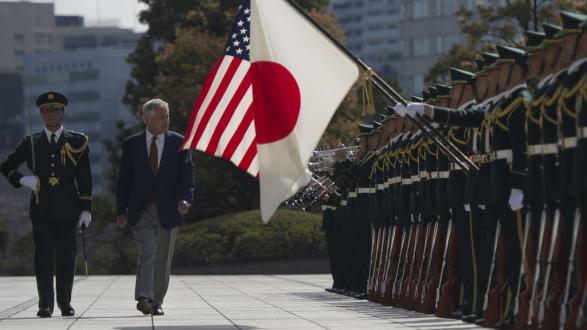In:
Global Beat is your weekly stop for news from around the world. Join us every Friday morning for important stories you should know about.
This week, Japan’s prime minister plans to revise the island nation’s pacifist constitution by 2020; Presidents Donald Trump and Vladimir Putin agreed to attempt another ceasefire in Syria; Spain plans to use the Brexit negotiations to end the low-tax status on Gibraltar; and more.
____________________
Americas
A bipartisan group of U.S. senators filed legislation this week to provide $10 billion in humanitarian aid to Venezuela and to impose sanctions on individuals responsible for corruption in the country. The Trump administration is also threatening to impose more sanctions following President Nicolás Maduro’s call for a new constitution. Meanwhile, protesters continue to clash with police in the streets. The unrest has claimed 29 lives in the past month.
Also check out:
- Puerto Rico files for biggest ever U.S. local government bankruptcy – Nick Brown, Reuters
Central & South Asia
India summoned Pakistan’s Ambassador Abdul Basit to demand action after two Indian soldiers were killed and mutilated by Pakistani forces in the disputed region of Kashmir. Their bodies were reportedly cut into pieces and taken over to the Pakistani side of the Line of Control, the military border between the Indian and Pakistani controlled parts of the region. Pakistan has denied the allegations. Many Indians took to social media to express their outrage and demand revenge.
Also check out:
- India’s tribal peoples caught between Maoist rebels and the state – Saurabh Sharma and Rishi Bhatnagar, CNN
China & East Asia
Japanese Prime Minister Shinzō Abe said this week that he plans to revise the country’s pacifist constitution by 2020. The role of Japan’s military is an issue that sharply divides the country. Its 70-year-old constitution, written in the aftermath of World War II, forbids Japan from waging war and maintaining a military except for self-defense. Japanese forces have been conducting military exercises with a U.S. Navy carrier strike group amid heightened tensions on the Korean Peninsula.
Also check out:
Europe & Russia
Spain plans to use the Brexit negotiations to end the low-tax status on Gibraltar, a British territory on Spain’s southern coast. Madrid sees Gibraltar as a “tax haven” that allows “unfair competition” with Spanish businesses. The European Council approved Brexit negotiation directives on Saturday, effectively giving Madrid a veto over any future EU-UK trade deal that could affect the British territory.
Also check out:
- EU to focus on Ireland in Brexit talks, says EU Commission’s chief Brexit negotiator – Mark Devenport, BBC News
Middle East & North Africa
U.S. President Donald Trump and Russian President Vladimir Putin agreed over the phone Tuesday to cooperate in Syria by brokering another ceasefire. It was their first phone conversation since the U.S. strike against the Syrian government in retaliation for a chemical weapons attack on civilians. The White House said the two leaders agreed to set up safe zones in Syria, but Putin’s spokesperson said safe zones were not discussed in detail. A statement from the Kremlin indicated Trump and Putin plan to have their first in-person meeting in July on the sidelines of the Group of 20 Summit in Germany.
Also check out:
- Believe it or not, Saudi Arabia was elected to the UN women’s rights commission – Amanda Erickson, Washington Post
Southeast Asia & Oceania
Singapore announced an investment of up to $150 million in artificial intelligence and data science initiatives over the next five years. The island nation’s National Research Foundation, in collaboration with local agencies, will lead the AI initiative. The national program will focus on using AI to solve “grand challenges” and benefit society and industry, including finance, city management solutions, and healthcare. The Singapore Data Science Consortium will strengthen collaborative research ties between universities and the data science industry.
Also check out:
- Suu Kyi rejects UN probe into Myanmar violence – Michael Peel, Financial Times
Sub-Saharan Africa
The African Editors Forum called on African governments to abolish all laws that infringe on media freedom. The statement was released on May 3, designated as World Press Freedom Day by the UN General Assembly in 1993. The 2017 theme was “Critical minds for critical times: Media’s role in advancing peaceful, just, and inclusive societies.” The group of editors expressed concern about the state of media freedom in Zambia, Cameroon, South Sudan, Republic of Congo, Uganda, Djibouti, Burundi, Nigeria, Mali, and Eritrea.
Also check out:
- Six solar-powered airports take off in South Africa – Katy Scott, CNN




